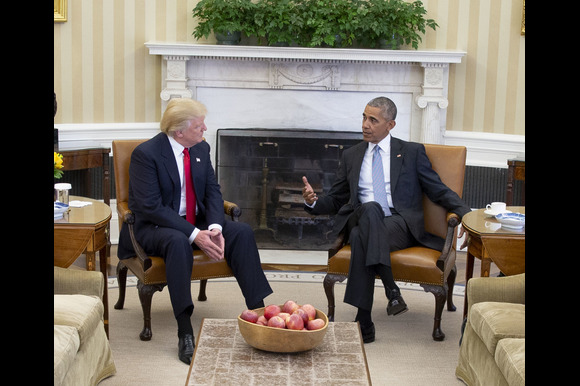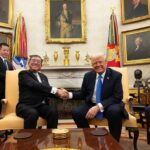Former President Donald Trump has accused his predecessor, Barack Obama, of committing “treason,” claiming that Obama orchestrated a plot to undermine his presidency by linking him to alleged Russian interference in the 2016 U.S. election.
Speaking at the White House, Trump alleged that the former president and his administration attempted to delegitimize his electoral victory over Democratic candidate Hillary Clinton. “They tried to steal the election,” Trump said, asserting that Obama had been directly involved in a conspiracy to sabotage his administration from the outset.
In response to Trump’s remarks, a spokesperson for Obama issued a rare public rebuttal, describing the allegations as “a weak attempt at distraction.” The spokesperson dismissed the claims as “outrageous,” saying, “Out of respect for the office of the presidency, our office does not normally dignify the constant nonsense and misinformation flowing out of this White House with a response. But these claims are outrageous enough to merit one. These bizarre allegations are ridiculous and a weak attempt at distraction.”
Trump’s comments were made on Tuesday while fielding questions from reporters about the late Jeffrey Epstein, a convicted sex offender who died by suicide in jail in 2019 while awaiting trial. The Trump administration has been facing mounting pressure to release more information related to Epstein, who was known to have numerous influential connections.
During the exchange with reporters, Trump said: “The witch hunt that you should be talking about is they caught President Obama absolutely cold. It’s time to go after people—Obama’s been caught directly. He’s guilty. This was treason. This was every word you can think of.”
Trump made the remarks while hosting Philippines President Ferdinand Marcos Jr. in the Oval Office.
The allegations from Trump follow a recent report by U.S. Director of National Intelligence Tulsi Gabbard, which accuses Obama and members of his national security team of orchestrating a “years-long coup against President Trump.” The report has been strongly criticized by Democrats, who have labeled its findings as false and politically motivated.
According to the declassified documents included in the report, emails among Obama aides indicate that intelligence suggesting Russia had not succeeded in hacking U.S. election systems was allegedly downplayed. A declassified presidential daily briefing dated December 8, 2016—weeks after Trump’s electoral win—stated, “We assess that Russian and criminal actors did not impact recent U.S. election results by conducting malicious cyber activities against election infrastructure.”
However, the FBI, which had co-authored the assessment, later dissented, and a meeting was convened at the White House the following day involving top intelligence officials. According to the report, following the meeting, an aide to then-Director of National Intelligence James Clapper sent an email requesting the preparation of a revised assessment “per the president’s request,” outlining “tools Moscow used and actions it took to influence the 2016 election.”
Gabbard interpreted the communication as evidence of a “treasonous conspiracy” and indicated that she would refer several Obama-era officials to the Justice Department for possible prosecution.
Obama’s spokesperson rejected this interpretation, saying: “Nothing in the document issued last week undercuts the widely accepted conclusion that Russia worked to influence the 2016 presidential election but did not successfully manipulate any votes.”
A comprehensive assessment released by the U.S. intelligence community in January 2017 concluded that Russia had indeed attempted to sway the election in Trump’s favor by undermining Hillary Clinton’s campaign. The methods allegedly used included disinformation campaigns via social media bot farms and the hacking of Democratic Party emails. Despite these efforts, officials determined that the operations did not succeed in altering the actual vote count.
In 2020, a bipartisan report from the Senate Intelligence Committee reaffirmed the conclusion that Russia had sought to support Trump’s 2016 bid for the presidency. Among the Republican co-signatories of the report was Senator Marco Rubio, who now serves as Secretary of State.
The first two years of Trump’s term were clouded by a Justice Department investigation into potential coordination between his campaign and Russian operatives. The inquiry, led by Special Counsel Robert Mueller, ultimately found insufficient evidence to charge Trump or his campaign with conspiracy.
A later investigation conducted by Special Counsel John Durham criticized the FBI’s original probe, describing it as lacking “analytical rigor” and based on “raw, unanalysed and uncorroborated intelligence.” However, the Durham report also failed to establish any criminal wrongdoing tied to the launch of the investigation.
Trump’s renewed accusations come amid ongoing political tensions and persistent efforts by his allies to challenge the legitimacy of the investigations that marked the early years of his presidency.






